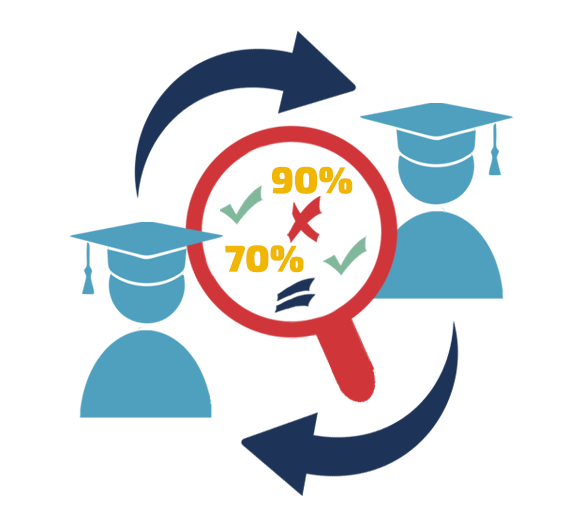SELF AND PEER EVALUATION USING ICT

In this workshop you will learn about the importance of formative assessment of knowledge, opinions and ideas in the pedagogical process and how it can be most effectively supported by ICT. Through a comparative analysis of different tools in terms of assessment strategies, learning analytics, planning and feedback options, you will gain a better insight into the tools that can meaningfully support formative assessment of the learning process. In the following, you will also learn more about the possibilities of these tools. The workshop will focus on the possibilities of self and peer evaluation.
Tadeja Nemanič, Mateja Bevčič, Sara Drožđek, Sanja Jedrinović, Anja Luštek, Ana Žabkar Šalić, Jože Rugelj
17 November - 24 November 2021
Tadeja Nemanič
The workshop is designed to introduce self and peer evaluation using ICT. It consists of 4 sections in addition to an introduction and a conclusion:
- Formative assessment of the learning process
In the first topic, you will have the opportunity to learn about the definition of formative assessment. The whole section is based on the European Framework for Digital Competences of Educators. You will learn about different strategies for assessing student learning, ways of analysing evidence of learning and ways of giving feedback.
As a conclusion to the section, you will be required to pass a quiz, the purpose of which is to check your understanding of the content presented within the section as it links to the content in the following sections. However, it is recommended to participate in a forum where you can share your experiences of formative monitoring of learning.
- Comparative analysis of tools
In the second topic, we present a comparative analysis of the tools according to the aspects of evaluation: peer evaluation, self-evaluation, teacher evaluation, analysis of evidence of learning, feedback and planning, which are discussed in more detail within each section later in the workshop. In addition, you can also access basic tutorials in the form of tutorials on how to work with each tool.
In this section, you can participate in a forum where you can write down your experiences and opinions on the use of the tools for formative assessment purposes. As a prerequisite for continuing to the next section, you must have looked at the comparative analysis of the tools and marked it as done.
- Self-evaluation
In this topic you will learn about strategies for student self-evaluation and useful ICT for this purpose, such as the quiz creation tools Kahoot and Quizizz, the interactive video creation tool Edpuzzle, the e-portfolio Mahara, the interactive presentation tools Pear Deck and Nearpod, and the tool for the creation of different interactive learning materials H5P. When introducing each tool, you can access guides to help you create activities for the purpose of self-evaluation.
As a final task of this section, you are required to design a learning activity in your subject area to support the achievement of specific learning objectives and to create a tool for student self-assessment. Participation in a forum on the topic of self-evaluation is recommended.
- Peer evaluation
In this topic you will learn about strategies for peer assessment of students and useful ICT for this, such as some of the activities of the Moodle online classroom (workshop, forum, glossary, database), the Trello collaborative environment and the Mindmeister collaborative mind-mapping tool. When introducing each tool, you can access guides to help you create activities for peer evaluation purposes.
As a final task of this section, you are required to design a learning activity in your subject area to support the achievement of specific learning objectives and to create a peer assessment tool for students. Participation in a forum on peer assessment is recommended.
Objectives of the online workshop:
- to learn about the elements of formative assessment using ICT;
to review a comparative analysis of concrete tools that support formative assessment of the learning process; - to learn about self-evaluation strategies and tools that can support self-evaluation;
- learning about peer evaluation strategies and tools that can support peer evaluation;
- creating interactive learning materials to support multiple types of assessment and formative assessment.
Prerequisites for the recognition of the online workshop:
- You are kindly invited to participate in various activities (e.g. discussion) in the different sessions during the scheduled workshop time, which are recommended and not compulsory.
- It is compulsory to successfully complete the quizzes at the end of the first topics (Introduction and Formative Assessment) during the announced workshop period.
- During the announced workshop period, it is compulsory to participate in at least one of the discussions offered on the ICT presented, which allows for formative assessment of the learning process.
- It is compulsory to successfully complete the final activities of the chapters within the time limit of the workshop.
- At the end of the workshop, it is mandatory to fill in a survey in order to obtain feedback from the participants as a basis for optimising future editions of the online workshop.
After successfully completing all activities, participants will receive a certificate in the online classroom and a few days after the course completion, a certificate of completion of the pedagogical training by post (to the faculty).


